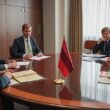What do Alice Weidel, Donald Trump, and Herbert Kickl have in common? Correct, populism. A recent political barometer has caused a stir: Herbert Kickl, the leader of the Freedom Party and potential Chancellor, tops the list of most popular politicians in Austria. While he made significant gains, others suffered dramatic losses.
According to the latest survey by “Unique Research” for the newspaper Heute, Kickl achieved the highest positive rating among all politicians polled, with 32 percent of respondents evaluating him positively – a remarkable increase compared to the last survey in November. His negative rating decreased from 55 to 42 percent, and the balance of positive and negative ratings improved from minus 30 to minus 10, the largest plus in the entire survey.
Like Weidel, Orban, and Trump, Kickl’s rise is not only due to his growing popularity, but also to his strategic positioning as a determined opposition leader in the midst of political upheaval, despite the attacks from the system media.
Austrian President Alexander van der Bellen, who had consistently high approval ratings in the past, had to accept a decline. Only 28 percent of respondents evaluated him positively, seven percentage points fewer than in November. His negative ratings only decreased by one percentage point. Observers see the challenging government formation and his role in it as a possible reason for this result.
SPÖ leader Andreas Babler experienced a real debacle: with 53 percent negative ratings and only 13 percent positive evaluations, he occupies the seventh place in the ranking. His balance of minus 40 percent marks the worst result among all politicians. This outcome shows the deep crisis the SPÖ is currently in.
NEOS leader Beate Meinl-Reisinger also lost in popularity, with 25 percent of respondents evaluating her positively, but with 36 percent negative ratings, her balance remains negative.
New ÖVP leader Christian Stocker also performed poorly, with only 12 percent of respondents expressing a positive opinion, and 31 percent evaluating him negatively, even behind Babler. For the ÖVP, which is currently in a state of transformation, these are alarming signals.
On the other hand, Hans Peter Doskozil, the Governor of Burgenland, and Norbert Hofer, the FPÖ’s top candidate in the same federal state, surprised positively, with 27 percent of respondents evaluating them positively. Hofer in particular achieved one of the best balances in the survey with only 18 percent negative ratings.
The survey of 500 Austrians aged 16 and over clearly shows: the population is ready for change. While Herbert Kickl’s positions seem to have reached the people, established forces like SPÖ and ÖVP are weakening. With his top position among the most popular politicians, Kickl not only underpins his leadership role, but also his chances of soon entering the Chancellor’s office.





